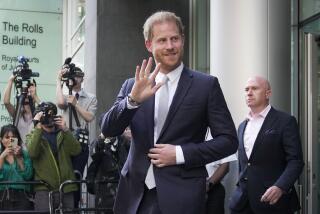British Press May Face Crackdown Over Sensationalism
- Share via
LONDON — The media warned of censorship Sunday after the reported recommendation of a government-ordered inquiry that the freewheeling ways of Britain’s press be sharply curbed.
The report, due to be formally presented to Prime Minister John Major today by lawyer David Calcutt, was leaked ahead of time and received wide publicity over the weekend in London’s newspapers, which said it calls for tough, new standards on what they may publish.
The Calcutt recommendations, according to published reports, call for the formation of a public body with power to impose fines and force newspapers to print apologies and prominent corrections. They also call for the enactment of a privacy law that would make it an offense to trespass or take photographs on private property for journalistic ends.
Lord McGregor, chairman of the Press Complaints Commission--a voluntary body established two years ago to oversee media standards--declared Sunday that a statutory body with penal powers would be “a disaster for our democracy. . . .”
A previous inquiry by Calcutt into alleged press abuses led to the establishment of the Press Complaints Commission, which replaced a former voluntary body, the Press Council, because the inquiry decided that voluntary regulation should be given another try.
In that earlier attempt at self-regulation, the Secretary of State for National Heritage, a Cabinet ministry that supervises media legislation, warned that the press was “drinking at the last-chance saloon.”
Calcutt’s latest inquiry resulted from growing anger about the behavior of Britain’s often-described “gutter press” among members of Parliament and other elements of the Establishment, lately outraged at what they consider intrusions into private lives, particularly those of members of the Royal Family.
The press--especially the tabloids competing hotly for circulation--had a field day in 1992.
Stories the media covered in sensational detail included: the marital problems of Prince Charles and Princess Diana; the tapes of Diana’s seemingly amorous conversations with a male friend; the separation of the Duke and Duchess of York; the duchess’s photographed vacation involvement with U.S. businessman John Bryan; the queen’s Christmas speech, leaked in advance; the unwed motherhood of Health Secretary Virginia Bottomley; the affair of Liberal Democrat Party leader Paddy Ashdown with a researcher, and the affair of National Heritage Secretary David Mellor with an actress, a scandal that led to his resignation from the Cabinet.
The new Calcutt recommendations also reportedly call for rules designed to prevent electronic eavesdropping and the unauthorized interception of telephone conversations.
According to published reports, Calcutt, a senior attorney and administrator at Cambridge University, proposes setting up a tribunal made up of a senior judge, appointed by the Lord Chancellor, and two lay assessors, named by the heritage secretary, with powers to levy large fines against offending newspapers.
More to Read
Sign up for Essential California
The most important California stories and recommendations in your inbox every morning.
You may occasionally receive promotional content from the Los Angeles Times.













